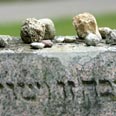
Central Oregon Jews get new cemetery
Jewish community now has second place to remember its loved ones as first cemetery has no more room for graves
They sang in Hebrew of God, full of compassion, providing refuge and rest as a violinist and flutist played an ancient song.
For the Jewish community in Central Oregon, the land is now sacred, and those of Jewish faith or heritage have a new place to remember their loved ones.
The ceremony sanctified the land as a Jewish cemetery, the second in the region. The first, a small corner at Pilot Butte Cemetery in Bend, has no more room.
Securing the section, located in Deschutes Memorial Gardens, was imperative, said Harriet Richard. She spearheaded the push to get a new site for Jewish burials after receiving a phone call in May from a friend.
"My mother is dying,' the friend told her, "and there is no place for her to be buried."
"I got in my car and drove that day to Deschutes Memorial Gardens," Richard said. "It was absolutely essential."
Now, Richard said, there is plenty of space for Central Oregon's growing Jewish population. The cemetery has been named Gan Shalom, which in Hebrew means "Garden of Peace."
What it symbolizes, said Rabbi Glenn Ettman, is stability. Ettman leads Temple Beth Tikvah, one of several Jewish congregations in the region.
"One of the things that's tremendous about setting up a cemetery," he said, "is it's a sign of strength and a sign of permanence."
There is no count of the number of those of Jewish faith or heritage in Central Oregon, but anecdotal evidence is that it's growing.
Rabbi Jay Shupack, who leads another temple called the Jewish Community of Central Oregon, said the first burial in Pilot Butte Cemetery's Jewish section took place in 1994.
Now, those 30 or so plots at Pilot Butte are either filled or purchased. And expansion of the section isn't reasonable, Shupack said, as the available neighboring land is solid lava rock beneath the surface. It would have been hugely expensive to drill down.
The new site offers 104 burial plots, which Richard anticipates will fulfill the needs of the populace for years to come.
It's now one of nine sections at Deschutes Memorial Gardens, said Jerome Daniel, managing director of the property. Other specific sections include ones for Catholics and for veterans.
Daniel added that there is room for Gan Shalom to grow down the line: Of Deschutes Memorial Gardens' roughly 26 acres, only about 10 are currently utilized.
Richard praised Daniel's work in making the new section happen. While the land was already part of Deschutes Memorial Gardens, other requirements had to be met to make it ready for burials, including surveying and platting.
"It's been at considerable expense to him," she said.
The section will be managed by Deschutes Memorial Gardens, with a committee composed of members of the region's Jewish community that will review the requests for burials there to make sure they qualify.
Keeping the community as a community
Richard and Ettman emphasized that Gan Shalom will be an inclusive cemetery. It will be available not only to those active in the Jewish faith, but also to their spouses and those with Jewish heritage.
"In this day and age, interfaith marriage is a reality," Ettman said.
One of the few restrictions will be on the signs within the cemetery, Richard said, which cannot bear the symbols of other faiths.
For the area Jewish community, Ettman said, Gan Shalom brings its bonds full circle.
"It's keeping the community as a community, even in death," he said.
Presently the cemetery is open space. But that will soon change.
Sunday's ceremony made the land available for burials. It included reflections in both English and Hebrew, time to thank those who made the project happen, songs and the ritual drinking of wine and breaking of bread called the Kiddush and the Hamotzi that cements the unity of the community at the end of the ceremony.
As with other sections of Deschutes Memorial Gardens, shrubbery will be planted to demarcate its borders, Daniel said.
An entrance with a gate and stone marker will be erected, as well. Richard said she expects fundraisers will be held to make that happen.
Eventually, the cemetery will be a final resting place. The markers will likely be flat to the ground, Ettman said. And passers-by will likely see acorn-size stones set upon the graves.
Ettman said traditionally people go to visit the graves of loved ones once a year right before the Jewish New Year. They leave a small stone to note their visit to the deceased. A stone is permanent, Ettman said, just like the memories of those who have died.
"As the New Year starts," Ettman said, "it's looking at where you have been as well as where you want to go."
Shupack noted how unusual it is to start a new cemetery and wondered where Sunday's consecration will lead.
He recounted the history of the first Jews in the United States, who arrived by boat in the 1600s. They had been expelled from what is now Brazil, and were moored off what then was New Amsterdam, waiting for permission to come ashore.
They were allowed to stay, and became the first of many Jews who would eventually make New York City home.
Such is this moment, Shupack said.
"We're seeing it from the other side of the lens," he said. "Who will be here 100 years from now? Who will come to visit the graves in 100 years? What will the Jewish community be like in Central Oregon?"
"It will become clear in the future," he said, "how momentous today is."
- Follow Ynetnews on Facebook










